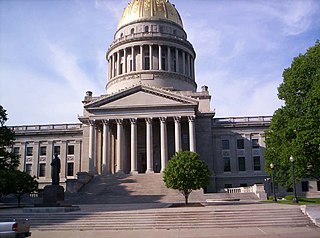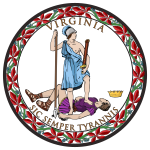
The 1982 United States Senate elections were held on November 2, 1982. They were elections for the United States Senate following Republican gains in 1980. The 33 Senate seats of Class 1 were up for election in 1982. A total of four seats changed hands between parties, with Democrats winning seats in New Jersey and New Mexico, and Republicans taking seats in Nevada and the seat of the lone independent, Senator Harry Byrd Jr., in Virginia. Democrats made a net gain of one seat in the elections, while Republicans stayed at 54 seats for a majority. However, the Democratic gain in New Jersey replaced a Republican that had been appointed earlier in the year.

The Cook Political Report with Amy Walter is an American online newsletter that analyzes elections and campaigns for the U.S. Presidency, the United States Senate, the United States House of Representatives, and U.S. governors' offices. Self-described as independent and nonpartisan, it was founded by political analyst Charlie Cook in 1984. Amy Walter is the editor, publisher, and owner.

The 2006 United States Senate election in West Virginia was held November 7, 2006. Incumbent Democrat Robert Byrd won re-election to a ninth term. He was sworn in on January 3, 2007. However, he died in office on June 28, 2010, before the end of his term. This was Byrd's closest re-election.

The 1912–13 United States Senate elections were held on various dates in various states. They were the last U.S. Senate elections before the ratification of the Seventeenth Amendment in 1913, establishing direct elections for all Senate seats. Senators had been primarily chosen by state legislatures. Senators were elected over a wide range of time throughout 1912 and 1913, and a seat may have been filled months late or remained vacant due to legislative deadlock. Some states elected their senators directly even before passage of Seventeenth Amendment. Oregon pioneered direct election and experimented with different measures over several years until it succeeded in 1907. Soon after, Nebraska followed suit and laid the foundation for other states to adopt measures reflecting the people's will. By 1912, as many as 29 states elected senators either as nominees of their party's primary or in conjunction with a general election.

From the time of the Great Depression through the 1990s, the politics of West Virginia were largely dominated by the Democratic Party. In the 2000 presidential election, George W. Bush claimed a surprise victory over Al Gore, with 52% of the vote; he won West Virginia again in 2004, with 56% of the vote. West Virginia is now a heavily Republican state, with John McCain winning the state in 2008, Mitt Romney in 2012 and Donald Trump in 2016 and 2020.

The 2008 United States Senate election in West Virginia was held on November 4. Incumbent Democratic U.S. Senator Jay Rockefeller won re-election to a fifth term in a landslide, defeating Republican Jay Wolfe by a 27-point margin. Despite this overwhelming win, this remains the last time that a Democrat has won West Virginia's Class 2 U.S. Senate seat. In fact, in both of the two subsequent elections for the seat, Republicans have swept every single county.

The 1996 United States Senate election in Virginia was held on November 5, 1996. Incumbent Republican U.S. Senator John Warner won re-election to a fourth term over Democratic challenger Mark Warner (unrelated), who served as Governor of Virginia from 2002 to 2006 and won this Senate seat in 2008 after John Warner declined to run for re-election that year.

The 2000 United States elections were held on November 7, 2000. Republican Governor George W. Bush of Texas defeated Democratic Vice President Al Gore of Tennessee in the presidential election. Republicans retained control of both houses of Congress, giving the party unified control of Congress and the presidency for the first time since the 1954 elections. It was the Republicans' first trifecta in the 21st century, the Democrats would win their first trifecta in this century in 2008.

The 2008 United States presidential election in West Virginia took place on November 4, 2008, and was part of the 2008 United States presidential election. Voters chose 5 representatives, or electors to the Electoral College, who voted for president and vice president.

The 2014 United States Senate elections were held on November 4, 2014. A total of 36 seats in the 100-member U.S. Senate were contested. Thirty-three Class 2 seats were contested for regular six-year terms to be served from January 3, 2015, to January 3, 2021, and three Class 3 seats were contested in special elections due to Senate vacancies. The elections marked 100 years of direct elections of U.S. senators. Going into the elections, 21 of the contested seats were held by the Democratic Party, while 15 were held by the Republican Party.

The 1868–69 United States Senate elections were held on various dates in various states. As these U.S. Senate elections were prior to the ratification of the Seventeenth Amendment in 1913, senators were chosen by state legislatures. Senators were elected over a wide range of time throughout 1868 and 1869, and a seat may have been filled months late or remained vacant due to legislative deadlock. In these elections, terms were up for the senators in Class 1.

The 2014 United States elections were held on Tuesday, November 4, 2014, in the middle of Democratic President Barack Obama's second term. Republicans retained control of the House of Representatives and won control of the Senate.

The 2014 United States House of Representatives election in West Virginia was held on November 4, 2014, to elect the three U.S. representatives from West Virginia, one from each of the state's three congressional districts.

The 2018 United States Senate elections were held on November 6, 2018. Among the 100 seats, the 33 of Class 1 were contested in regular elections while two others were contested in special elections due to Senate vacancies in Minnesota and Mississippi. The winners were elected to six-year terms running from January 3, 2019, to January 3, 2025. Senate Democrats had 26 seats up for election, while Senate Republicans had nine seats up for election.

The 2016 United States elections were held on Tuesday, November 8, 2016. Republican nominee Donald Trump defeated Democratic former Secretary of State Hillary Clinton in the presidential election, while Republicans retained control of Congress. This marked the first and most recent time Republicans won or held unified control of the presidency and Congress since 2004.

The 2020 United States Senate elections were held on November 3, 2020, with the 33 class 2 seats of the Senate contested in regular elections. Of these, 21 were held by Republicans, and 12 by Democrats. The winners were elected to six-year terms from January 3, 2021, to January 3, 2027. Two special elections for seats held by Republicans were also held in conjunction with the general elections: one in Arizona, to fill the vacancy created by John McCain's death in 2018; and one in Georgia, following Johnny Isakson's resignation in 2019. These elections ran concurrently with the 2020 United States presidential election in which incumbent President Donald Trump lost to Democratic nominee Joe Biden.

The 2024 United States elections are scheduled to be held on Tuesday, November 5, 2024. During this presidential election year, the President of the United States and Vice President will be elected. In addition, all 435 seats in the United States House of Representatives and 34 of the 100 seats in the United States Senate will be contested to determine the membership of the 119th United States Congress. Thirteen state and territorial governorships and numerous other state and local elections will also be contested.

The 1992 Iowa State Senate elections took place as part of the biennial 1992 United States elections. Iowa voters elected state senators in 32 of the state senate's 50 districts—all 25 of the even-numbered seats were up for regularly-scheduled elections and, due to the oddities of redistricting following the 1990 Census, seven of the odd-numbered seats were up as well. State senators serve four-year terms in the Iowa State Senate, with half of the seats traditionally up for election each cycle.

The 2019 United States state legislative elections were held on November 5, 2019. Seven legislative chambers in four states held regularly-scheduled elections. These off-year elections coincided with other state and local elections, including gubernatorial elections in three states.

The 2017 United States state legislative elections were held on November 7, 2017. Three legislative chambers in two states held regularly-scheduled elections. These off-year elections coincided with other state and local elections, including gubernatorial elections in two states.





















